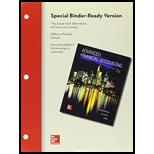
Concept explainers
Concept Introduction:
Depreciation is refer as the process of reduction in the value of assets due to normal usage over time. It is non-cash expense for the company.
Requirement 1
Calculate the ownership percentage clutch by “P” in “S” corporation.
b.
Concept Introduction:
Depreciation
Depreciation is refer as the process of reduction in the value of assets due to normal usage over time. It is non-cash expense for the company.
Requirement 2
Explain who will incorporate the sale of equipment.
c.
Concept Introduction:
Depreciation
Depreciation is refer as the process of reduction in the value of assets due to normal usage over time. It is non-cash expense for the company.
Requirement 3
Calculate the transfer amount of equipment in case of intercompany.
d.
Concept Introduction:
Requirement 4
Non-Controlling Interest
Non-controlling interest is held by subsidiary company. It is also known as minority interest. Subsidiary company is considered as the company that is owned or influenced by a holding company.
Calculate the income assign to non-controlling interest.
e.
Concept Introduction:
Depreciation
Depreciation is refer as the process of reduction in the value of assets due to normal usage over time. It is non-cash expense for the company.
Requirement 5
Calculate the depreciation amount that should be reported in income statement.
f.
Concept Introduction:
Elimination Entries
Eliminating entries are required to pass when investment and other holdings are eliminating in some cases. It is the
Requirement 6
Prepare the elimination entries for completing consolidated financial statement.
Want to see the full answer?
Check out a sample textbook solution
Chapter 7 Solutions
LOOSE-LEAF Advanced Financial Accounting with Connect
- Please help with accountingarrow_forwardAccounting problem with solutionarrow_forwardHome Insert Draw Page Layout Formulas Data Review View Automate Developer Calibri (Body) 12 ✓ Α Αν Conditional Formatting ✓ ☑Insert v Σ Custom Paste B I U ✓ ✓ $ ✓ %9 0 .00 →0 Format as Table ✓ Cell Styles ▾ Delete ✓ Format ✓ C26 fx A B D E F G 1 Instruction: 2 1. Please complete the following budget plan using appropriate cell references format (the cells highlighted in grey) 3 2. Please use fill handler to complete the table. E.g. in cell C16, build one formula and generate other formulas to D16 and E16 with fill handler. 4 3. For "Cost of Goods Sold" section (before "COGS Subtotal"), build one formula in cell C19, and generate formulas until E21. Overhead (B21) is 20% (B10) of the labor cost (B20). 5 4. For "COGS Subtotal", build one formula in C22, and generate the formulas to E22. 6 5. Similar requirements for "Selling Expenses" and "Projected Earnings" section. 7 6. Please be noted, for all items under "Cost of Goods Sold", and "Selling Expenses" the cost is per ONE shoe, not per…arrow_forward

 AccountingAccountingISBN:9781337272094Author:WARREN, Carl S., Reeve, James M., Duchac, Jonathan E.Publisher:Cengage Learning,
AccountingAccountingISBN:9781337272094Author:WARREN, Carl S., Reeve, James M., Duchac, Jonathan E.Publisher:Cengage Learning, Accounting Information SystemsAccountingISBN:9781337619202Author:Hall, James A.Publisher:Cengage Learning,
Accounting Information SystemsAccountingISBN:9781337619202Author:Hall, James A.Publisher:Cengage Learning, Horngren's Cost Accounting: A Managerial Emphasis...AccountingISBN:9780134475585Author:Srikant M. Datar, Madhav V. RajanPublisher:PEARSON
Horngren's Cost Accounting: A Managerial Emphasis...AccountingISBN:9780134475585Author:Srikant M. Datar, Madhav V. RajanPublisher:PEARSON Intermediate AccountingAccountingISBN:9781259722660Author:J. David Spiceland, Mark W. Nelson, Wayne M ThomasPublisher:McGraw-Hill Education
Intermediate AccountingAccountingISBN:9781259722660Author:J. David Spiceland, Mark W. Nelson, Wayne M ThomasPublisher:McGraw-Hill Education Financial and Managerial AccountingAccountingISBN:9781259726705Author:John J Wild, Ken W. Shaw, Barbara Chiappetta Fundamental Accounting PrinciplesPublisher:McGraw-Hill Education
Financial and Managerial AccountingAccountingISBN:9781259726705Author:John J Wild, Ken W. Shaw, Barbara Chiappetta Fundamental Accounting PrinciplesPublisher:McGraw-Hill Education





